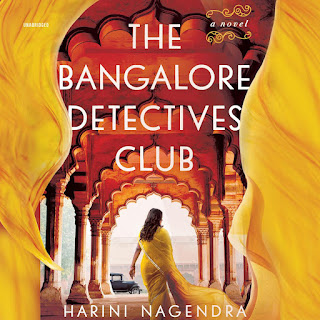Kaveri Murthy is the young wife of Dr. Ramu Murthy, in 1921 India. Legally, they've been married for three years, but Ramu and his father don't believe in child marriage, and Kaveri's own father (though not her mother) supported her wish to finish her education at the elite secondary school she was attending. Now she is in Bangalore, living with her husband, and learning the art of being a wife. Cleaning is necessary but annoying, and cooking is a challenging skill to master.
She's still secretly studying math, but she leaps at the chance to go to the Century Club to swim with some of the other women she's met. It's her first exposure to the idea of a swimsuit, rather than just tying up her sari to be practical for swimming. The next evening, attending a dinner at the Century Club with her husband for the first time, she gets caught up in the investigation of a murder.
This is a cozy mystery, with warmth and humor, and with Kaveri and Ramu getting to know each other, learning each other's personalities, interests, and views on issues that affect them both. Kaveri is by nature a confident young woman, yet has been taught by her mother that straying from the strictest of traditional rules that govern married women will anger her husband, with possible terrible consequences. Thus, she's hiding the fact that she's still studying math, among other things.
The murder victim at the Century Club is a man with a very unsavory reputation, and the prime suspect is the Murthys' milkman, Manju, who was working the dinner for extra money that night. The fact that he flees and goes into hiding doesn't make him look less guilty, of course. Next morning, Manju's younger brother, Vanu, shows up to deliver their milk, and Kaveri begins to learn some disturbing things about Manju, including his abuse of his wife, Muniamma, Vanu, and others. Yet there's still nothing that makes Manju a likely suspect--except that he ran, and he's an easy target to prosecute. Since his conviction for murder would be a disaster for the already-struggling family, Kaveri yields to Vanu's plea that she help Manju, by trying to find the real killer.
Along the way she meets the Police Inspector Ismail, the gardener at the Century Club, and and a beautiful and kind prostitute. She gets better acquainted with the wives of her husband's colleagues at the hospital, and her elderly, well-born neighbor, Uma Aunty, whose father and husband would not allow her to even learn to read. Uma Aunty is pleased to trade cooking lessons for Kaveri for reading lessons for herself--and despite her initial hesitations, is soon drawn in to helping in the investigation, too.
Along with the investigation, we see the relationship between Kaveri and Ramu grow, including a lovely first visit to the library, where Ramu gets a family card so that Kaveri can read more books than the ones she brought with her.
This is a sweet and fun mystery, which nevertheless touches upon India's caste issues, the growing political conflict between Britian's colonial government over India, and the efforts of women to gain more freedom and independence. On these issues, Ramu can't always say publicly what he thinks, because as a doctor at the hospital, he's a government employee. As he and Kavari get to know each other better, though, they can both be more free in what they say to each other.
It's a lovely, engaging story, a pleasure to listen to.
I bought this audiobook.

No comments:
Post a Comment